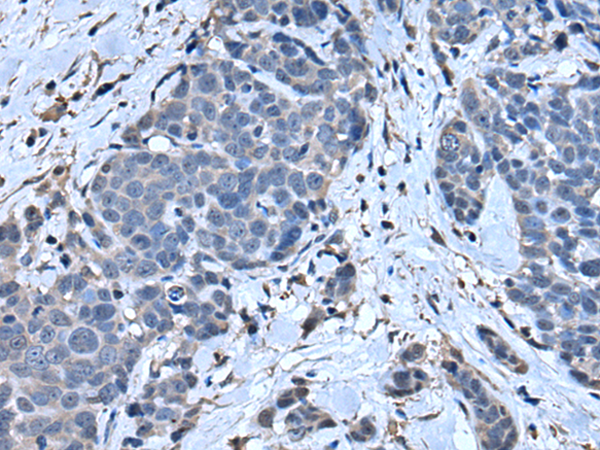
| WB | 咨询技术 | Human,Mouse,Rat |
| IF | 咨询技术 | Human,Mouse,Rat |
| IHC | 1/25-1/100 | Human,Mouse,Rat |
| ICC | 技术咨询 | Human,Mouse,Rat |
| FCM | 咨询技术 | Human,Mouse,Rat |
| Elisa | 1/5000-1/10000 | Human,Mouse,Rat |
| Aliases | ALP; MPI; ALK1; BLPI; HUSI; WAP4; WFDC4; HUSI-I |
| Host/Isotype | Rabbit IgG |
| Antibody Type | Primary antibody |
| Storage | Store at 4°C short term. Aliquot and store at -20°C long term. Avoid freeze/thaw cycles. |
| Species Reactivity | Human |
| Immunogen | Fusion protein of human SLPI |
| Formulation | Purified antibody in PBS with 0.05% sodium azide and 50% glycerol. |
+ +
以下是关于SLPI(分泌性白细胞蛋白酶抑制剂)抗体的3篇代表性文献及其摘要概括:
---
1. **文献名称**:*Secretory leukocyte protease inhibitor (SLPI) as a potential therapeutic target in viral respiratory infections*
**作者**:Taggart CC, et al.
**摘要**:该研究探讨了SLPI在呼吸道病毒感染(如流感)中的保护作用,发现SLPI抗体可通过中和病毒诱导的蛋白酶活性,减少上皮细胞损伤,提示其作为抗病毒治疗的潜在靶点。
---
2. **文献名称**:*Antibody-based targeting of SLPI enhances bacterial clearance in a murine model of pneumonia*
**作者**:Hiemstra PS, et al.
**摘要**:研究通过小鼠肺炎模型证明,使用特异性SLPI抗体可增强中性粒细胞介导的细菌清除能力,并抑制过度炎症反应,为SLPI抗体在细菌性肺炎中的治疗应用提供依据。
---
3. **文献名称**:*SLPI as a biomarker in chronic wound healing: Role of antibody detection in clinical samples*
**作者**:Ashcroft GS, et al.
**摘要**:该文献提出SLPI在慢性伤口愈合中的表达水平与预后相关,通过开发高灵敏度的SLPI抗体检测方法,证实其可作为评估伤口感染和愈合效率的生物标志物。
---
4. **文献名称**:*Targeting SLPI in cancer-associated inflammation: Antibody blockade suppresses tumor growth*
**作者**:Jin FY, et al.
**摘要**:研究发现SLPI在肿瘤微环境中通过调节巨噬细胞极化促进免疫抑制,使用单克隆抗体阻断SLPI可显著抑制小鼠肿瘤模型中的肿瘤生长,揭示其抗肿瘤免疫治疗潜力。
---
以上文献涵盖了SLPI抗体在抗感染、炎症调控、伤口愈合及肿瘤治疗等领域的研究方向。如需具体期刊信息或发表年份,可进一步补充关键词检索。
Secretory Leukocyte Protease Inhibitor (SLPI) is a small, cationic protein primarily produced by mucosal epithelial cells and immune cells. It plays a critical role in regulating inflammation and protecting tissues from protease-mediated damage by inhibiting enzymes like neutrophil elastase, cathepsin G, and trypsin. SLPI also exhibits antimicrobial, anti-inflammatory, and immunomodulatory properties, contributing to wound healing and maintaining mucosal barrier integrity. Its involvement in immune responses, particularly at mucosal surfaces (e.g., respiratory, oral, and reproductive tracts), has linked it to conditions such as chronic obstructive pulmonary disease (COPD), cystic fibrosis, and HIV infection.
SLPI antibodies are tools used to detect and quantify SLPI expression in research and clinical settings. They enable studies on SLPI's dual role in health and disease—balancing tissue protection with potential contributions to pathological processes like cancer progression or viral persistence. Monoclonal and polyclonal antibodies against SLPI are utilized in techniques like ELISA, Western blot, and immunohistochemistry to explore its spatial distribution, regulation, and interactions with pathogens or host cells. Recent research focuses on SLPI's potential as a therapeutic target or biomarker in inflammatory diseases, autoimmune disorders, and infections, driving demand for specific, high-affinity antibodies to unravel its complex biological functions.
×